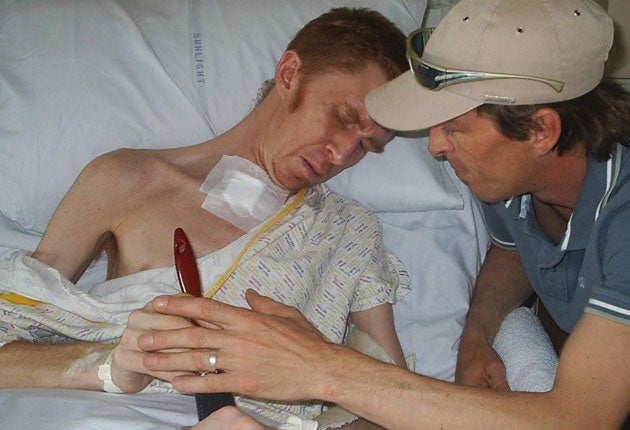
Police officers delegating duties to privately contracted staff in custody suites will be held ultimately responsible for the standard of care and treatment given to detainees, according to new government rules.
Custody sergeants must also be satisfied that those carrying out police tasks, such as monitoring someone’s well-being, are suitable, trained and competent to do so.
The major changes to the Police and Evidence (PACE) codes come four years after the case of Gary Reynolds, who fell into a coma while in the custody of Sussex Police. Mr Reynolds suffered a serious head injury during the arrest but had been identified as drunk, and therefore not checked regularly or roused.
He was found unconscious in his cell hours after the arrest – in a custody suite run by the private company Reliance Security – and left severely paralysed.
The Reynolds family has campaigned long and hard for changes to address failings identified by the Independent Police Complaints Commission in 2009.
Yet two years later Sharon McLaughlin, 32, died in another Sussex police station in March 2010. Police and private staff failed to properly care for her and no-one called a doctor despite clear signs that she was suffering from heroin withdrawals.
The changes mean custody sergeants must now ensure anyone suspected of being under the influence of drink or drugs is checked every half hour which campaigners hope will help reduce the numbers of deaths and serious injuries in custody.
There were 15 deaths in or following police custody during 2011/12. In 85 per cent of cases the individual was known to have taken or be in possession of drugs or alcohol at the time of arrest. Alcohol and drugs can often masquerade or mimic head injuries and serious health problems, and is the reason frequently given by police for failing to get medical care for a detainee.
Graeme Reynolds said the changes come four and half years too late for his brother. “There has been no justice whatsoever for what Gary, he’s been given a life sentence, paralysed for rest of his life, and it drives him insane that no-one has been brought to justice.
“But Gary will be pleased at this. We don’t think private companies should be running custody suites at all, but we hope that if custody officers are to carry the can, then no-one else will have to go through the same.”
Daniel Machover, Mr Reynold’s solicitor from Hickman and Rose, said the delay in the changes had been both “frustrating and concerning”.
“In the future, when it becomes apparent that such changes are necessary they should be expedited to ensure no further serious injuries or deaths take place in police custody.”
The PACE codes now stipulate that if custody officer duties are performed by other staff, then the outcomes must be reported as soon as possible to the responsible officer.
The amended code also now includes more scope to report and record, thereby reducing the risk of some incidents not being logged.
It follows new Association of Chief Police Officers (ACPO) national guidance on the safer detention and handling of detainees.
Helen Shaw, co-director of INQUEST, said the changes were long overdue. “Since the 1990s we have worked with too many families after deaths in custody where head injury or other serious illness has been dismissed as drunkenness alone and detainees have not been afforded appropriate medical care. It is particularly important that with the drive towards more privatisation of services within policing that custody officers are clearly responsible and accountable for the treatment and care of those in police custody.”
Subscribe to Independent Premium to bookmark this article
Want to bookmark your favourite articles and stories to read or reference later? Start your Independent Premium subscription today.
